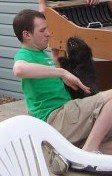Gee
Gee redefines discourse, or more so clarifies his vision of the defining aspects of the word. He changes discourse to Discourse. What could this possibly mean? Well, in the world, as in education, there are primary discourse and secondary discourse. Primary discourse is the first and foremost, the epicenter of a person’s language being. The primary discourse is first learned by a person, and therefore cannot be replicated. You cannot once again relive childhood and reacquire a language, attitude, style, and personality as a primary discourse. Therefore languages (or more so discourses) that are acquired after the primary discourse are secondary discourses. Both primary and secondary discourses fall under the large “D,” the new definition of Discourse. A person has many discourses in their lives, not just one. Gee argues that a person has many secondary discourses, but only one primary discourse. Now ask yourself, what is your primary discourse and what are your secondary discourses?
Delpit is independent, strong, and forceful. She reminded me of the saying, “stand for something, or fall for everything.” She disagrees with master Gee on the acquisitions of discourse, but agrees with him on the nature of it. There is also a dispute over function. One aspect of Delpit that I was at first confused about, but now see the light, is what she thought about not-teaching. After hearing her definition, which is against non-teaching (a logical negative), I don’t know where I stand. I don’t know if I agree with Gee, or want to take a more optimistic view with Delpit. Maybe there is a ground I can find in-between, where I can correct on papers, but not in the classroom.
Friday, October 17, 2008
Subscribe to:
Post Comments (Atom)

No comments:
Post a Comment